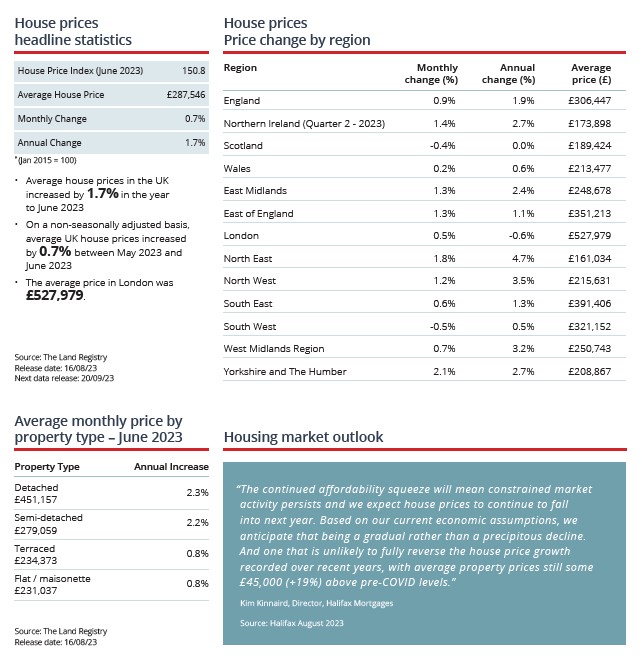Demand down but activity remains robust
The residential sales market experienced further negative indicators in July, according to the latest UK Residential Survey by the Royal Institution of Chartered Surveyors (RICS), with new buyer enquiries and agreed sales volumes continuing their decline.
At the national level, new buyer enquiries recorded a net balance of -45% in July, little changed from the previous month’s reading of -46%. This was described in the report as ‘symptomatic of a market losing further ground in the face of higher mortgage rates.’
The headline new instructions net balance dropped to -13% in July (compared to -3% in June). Agreed sales slipped to a net balance of -44% in July, down from -36% in June. This new figure is the weakest for the agreed sales measure since the early stages of the pandemic.
Separate data released by HMRC, however, paints a slightly different picture, with the number of completions rising in June to 94,690. At 86% of their 2017-19 average, this figure is up from 77% in May.
Simon Rubinsohn, RICS Chief Economist, commented, “The recent uptick in mortgage activity looks likely to be reversed over the coming months if the feedback to the latest RICS Residential Survey is anything to go by.”
Commercial hotspots for conversion
Almost 28,000 sites across England have the potential to be converted into residential properties, according to new data released from Searchland, with the combined market value estimated to be over £1.5bn.
London has roughly a third of England’s sites and an estimated market value in the region of £928m. In a speech in July, Housing Secretary Michael Gove referenced some of the commercial hotspots that are easier to convert into residential accommodation, including shops and restaurants.
Mitchell Fasanya of Searchland commented, “Disused commercial sites are a cornerstone of the government’s approach to solving the UK’s housing problems […] developers already have the opportunity to turn thousands of commercial properties into residential developments and these sites currently hold significant value in the current market.”
New-build price premium soars
The price of an average new-build property is now 52% higher than for existing homes, according to research by Sourced Franchise.
In the last year, price premiums for new-build property have increased by 20% to reach this average uplift of 52%.
The North East (83%) is home to the strongest new-build price premiums, with Scotland (72%), the East Midlands (66%), the North West (65%), West Midlands (63%) and Wales (62%) next in line. At the other end of the scale, London is home to the smallest new-build house price premium – just 17%.

All details are correct at the time of writing (21 August 2023)
It is important to take professional advice before making any decision relating to your personal finances. Information within this document is based on our current understanding and can be subject to change without notice and the accuracy and completeness of the information cannot be guaranteed. It does not provide individual tailored investment advice and is for guidance only. Some rules may vary in different parts of the UK. We cannot assume legal liability for any errors or omissions it might contain. Levels and bases of, and reliefs from, taxation are those currently applying or proposed and are subject to change; their value depends on the individual circumstances of the investor. No part of this document may be reproduced in any manner without prior permission.
